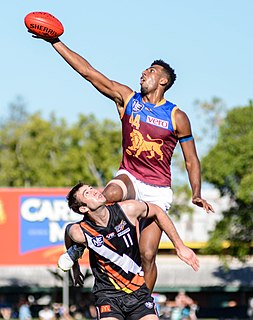This page is based on this
Wikipedia article Text is available under the
CC BY-SA 4.0 license; additional terms may apply.
Images, videos and audio are available under their respective licenses.

Australian rules football matches between teams representing Australian colonies, states and territories have been held since 1879. For most of the 20th century, the absence of a national club competition and international matches meant that football games between state representative teams were regarded with great importance. Football historian John Devaney has argued that: "some of the state of origin contests which took place during the 1980s constituted arguably the finest expositions of the game ever seen".
John Ribot is an Australian sports administrator and former rugby league footballer of the 1970s and 1980s. Once a Queensland State of Origin and Australian international representative winger or lock forward, Ribot was the 1980 NSWRFL season's equal top try-scorer. Also a member of the 1982 "Invincibles" Kangaroo touring squad, he played club football in Brisbane for Fortitude Valley, Wests and Redcliffe, and in Sydney for Newtown, Wests and Manly-Warringah.
The New South Wales Rugby League premiership was the first rugby league football club competition established in Australia and contributor to today's National Rugby League. Run by the New South Wales Rugby League from 1908 until 1994, the premiership was the state's elite rugby league competition.

Australian rules football in Queensland has a history which dates back to the mid-1860s. By the early 1880s it was the most prominent football code in the colony, but was progressively overtaken by the Rugby code, resulting in the local game disbanding in the early 1890s. The sport was revived in the early 1900s and continued to be played throughout the twentieth century, despite the majority of the state being considered for much of the century to be well behind the Barassi Line.

Australian rules football in South Australia has a history dating back to the early 1860s, and it has long been the most popular sport in the state.

The Championship of Australia was an Australian rules football tournament which was contested between football clubs from the Victorian, South Australian, West Australian and Tasmanian football leagues. The Championship took place three times in the 19th century and then from 1907 to 1914 with the exception of 1912 and every year from 1968 to 1975. All but two of the Championships were played in Adelaide and all of them occurred after the respective league seasons had ended. The 1975 Championship of Australia was the last edition of the competition with the 1976 NFL Championship replacing the format, albeit for only one year with VFL clubs.

Rugby league has the highest spectator numbers of the various codes of football in New South Wales. It began in Australia in 1907, when the New South Wales Rugby League was formed as a professional competition, following the rules of the Northern Rugby Football Union in England. Since then the state has been one of the major centres of the code; the headquarters of the Australian Rugby League are in New South Wales' largest city, Sydney. The premier state-level league is the New South Wales Cup, involving reserve teams from NSW and Canberra based NRL clubs as well as the first teams from other clubs.

Rugby union in Victoria describes the sport of rugby union being played and watched in the state of Victoria in Australia. The code was first introduced some time between the 1850s and 1880s but remained a minor sport played primarily in the private schools and amongst interstate expats. This has changed, particularly since the professionalisation of the game in the mid 1990s.
The Australian Football League is the top professional Australian rules football league in the world. The league consists of eighteen teams: nine based in the city of Melbourne, one from regional Victoria, and eight based in other Australian states. The reason for this unbalanced geographic distribution lies in the history of the league, which was based solely within Victoria from the time it was established in 1897, until the time the league expanded through the addition of clubs from interstate to the existing teams starting in the 1980s; until this expansion, the league was known as the Victorian Football League.

The Leagues Championship Cup, officially branded under the sponsor's name as the Foxtel Cup, was an annual Australian rules football club knockout cup competition involving clubs from the various state league competitions from around Australia. The tournament was organised by the Australian Football League (AFL), and was held annually between 2011 and 2014.

The F-League was an amateur and semi-professional futsal league endorsed and supported by Football Federation Australia and administered by Football NSW. As Australia's only endorsed national competition played under full FIFA laws of the game, it was considered the highest level of futsal in the country.
The 1980 Escort Championships was an Australian rules football knock out tournament held between March and July 1980. The tournament was organised by Australian Football Championships, and was contested by teams from the Victorian Football League, South Australian National Football League and West Australian Football League, and the representative teams from New South Wales, Tasmania, Queensland and the Australian Capital Territory. The tournament was won by North Melbourne, who defeated Collingwood in the Grand Final.
The 1995 Victorian Football Association season was the 114th overall season of the Australian rules football competition. The premiership was won by the Springvale Football Club, after it defeated Sandringham in the Grand Final on 24 September by 43 points; it was the second premiership won by the club.
The Australian Football Championships (AFC) night series, known during its history by a variety of sponsored names, was an Australian rules football tournament held annually between 1979 and 1986. The competition was a knock-out competition featuring clubs from the Victorian Football League, South Australian National Football League, West Australian Football League and state representative teams from the minor states, and matches were played primarily on weekday nights concurrently with the respective leagues' premiership seasons.








